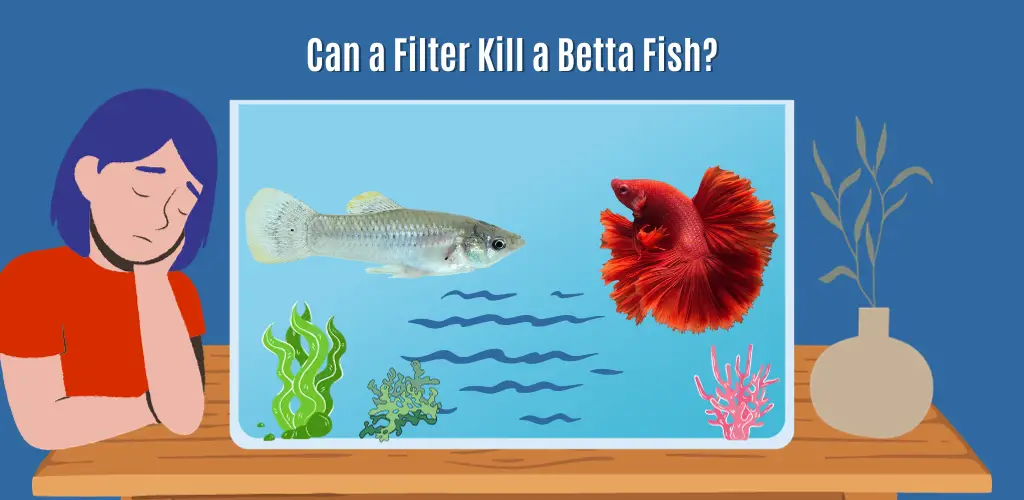This article ‘Can a Filter Kill a Betta Fish’ discusses the importance of filters in maintaining water quality in betta fish tanks while addressing the potential risks they pose. It covers filter types, proper selection, signs of stress in bettas due to filters, and tips for maintaining a safe environment. The essay emphasizes that while filters are essential, improper use can harm betta fish, and provides guidelines to ensure their well-being.
Additional Considerations for Filter Selection
Flow Rate Adjustability: It’s crucial to choose a filter with an adjustable flow rate. This allows you to customize the water movement to suit your betta’s comfort level, ensuring they are not stressed by strong currents.
Size of the Tank: Larger tanks often diffuse the flow from filters better than smaller ones. In a larger tank, the impact of the filter’s current is spread out, providing calmer areas where your betta can rest.
Positioning of the Filter: Positioning the filter in a way that creates gentle water movement is vital. Placing decorations or plants in front of the outflow can help break up the current and create a more betta-friendly environment.
Type of Filter Media: Using sponge filters or filters with gentle outflow can significantly reduce the risk of harming your betta. These filters are designed to provide adequate filtration without creating strong water movement.
Signs of Stress in Betta Fish Due to Filters
Stressed betta fish may exhibit various signs, including:
- Lethargy: Betta fish that spend a lot of time resting at the bottom or seem inactive might be stressed by strong currents.
- Loss of Appetite: Stress can lead to a reduced interest in food.
- Clamped Fins: Fins that are held close to the body can indicate stress.
- Hiding: Excessive hiding or trying to escape the current can be a sign that the filter’s flow is too strong.
How to Properly Introduce a Filter to a Betta Fish Tank
To introduce a filter to a betta fish tank, it’s crucial to acclimate the fish to the filter’s flow. This can be done by:
- Gradual Introduction: Start with the filter on a low setting and gradually increase the flow over several days.
- Creating Baffles: Use aquarium-safe materials to create barriers that reduce the flow rate and provide calm areas for the betta.
- Monitoring Behavior: Keep a close watch on the betta’s behavior during the introduction period. Adjust the filter settings if signs of stress are observed.
Tips for Maintaining a Filter in a Betta Fish Tank
Regular filter maintenance is essential to ensure its effectiveness and prevent harm to betta fish. This includes:
- Cleaning Filter Media: Regularly rinse mechanical filter media to prevent clogging while ensuring biological media is preserved to maintain beneficial bacteria.
- Checking for Clogs: Ensure the filter intake and outflow are not obstructed, which can affect water flow and filtration efficiency.
- Replacing Chemical Media: Follow the manufacturer’s instructions for replacing chemical media like activated carbon to maintain water quality.
Common Mistakes to Avoid When Using Filters for Betta Fish
Some common mistakes include:
- Using High Flow Filters: High flow rates can stress betta fish and should be avoided. Opt for filters designed for gentle flow.
- Neglecting Water Parameters: Regularly test water parameters to ensure the filter is maintaining optimal water quality.
- Lack of Hiding Spots: Providing plenty of hiding spots and resting areas can help reduce stress caused by water movement.
Conclusion
In conclusion, filters are essential for maintaining water quality in betta fish tanks but can potentially harm bettas if not used correctly. By choosing the right filter, monitoring its impact on the betta fish, and maintaining it properly, betta enthusiasts can provide a safe and healthy environment for their beloved pets. Ensuring that the filter’s flow rate is appropriate and the tank is properly maintained will help keep your betta happy and healthy. Remember, the key is to balance effective filtration with a calm environment that caters to the unique needs of betta fish. Can a filter kill a betta fish? Yes, it can if not used properly.
Additional Tips for Betta Fish Care
- Regular Water Changes: Even with a filter, regular partial water changes are necessary to maintain water quality.
- Observation: Regularly observe your betta for any signs of stress or illness and adjust the tank setup as needed.
- Tank Setup: Ensure the tank is well-planted with live or artificial plants and has plenty of hiding spots to mimic the natural habitat of bettas.
By following these guidelines, you can ensure that your betta fish remains healthy, happy, and thriving in a well-maintained aquarium environment. Can a filter kill a betta fish? With proper care and attention to filter selection and maintenance, you can minimize this risk.
FAQS
- Can a filter kill a betta fish? Yes, a filter can potentially kill a betta fish if it creates strong currents that stress the fish or if the intake is too strong, trapping or injuring the fish.
- What type of filter is best for a betta fish tank? Filters with adjustable flow rates and gentle outflow, such as sponge filters, are ideal for betta fish tanks to prevent strong currents.
- How can I tell if my betta is stressed by the filter? Signs of stress include lethargy, loss of appetite, clamped fins, and excessive hiding. Monitoring your betta’s behavior can help you identify stress early.
- How should I introduce a new filter to my betta fish tank? Gradually increase the flow rate over several days, create baffles to reduce flow impact, and monitor your betta’s behavior to ensure they are adjusting well.
- How often should I maintain my betta fish tank filter? Regular maintenance is key. Clean or replace filter media as needed, check for clogs, and follow manufacturer guidelines for replacing chemical media to maintain optimal water quality.



